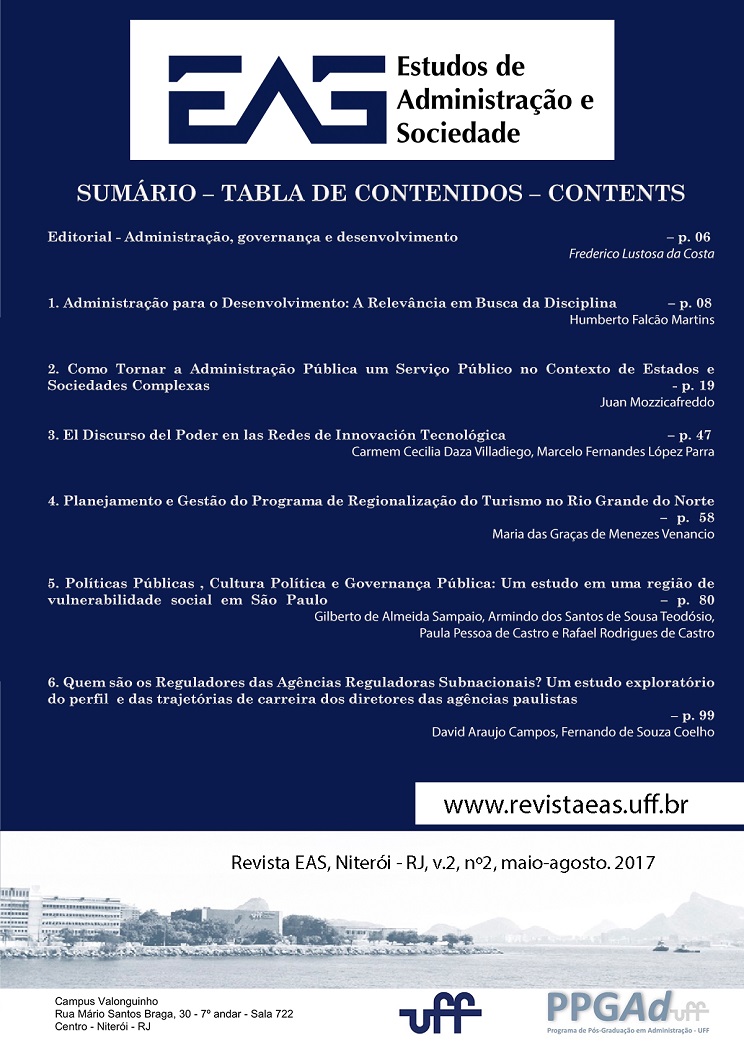Administração para o Desenvolvimento: A Relevância em Busca da Disciplina
DOI:
https://doi.org/10.22409/eas.v2i2.38Resumo
Este artigo parte dos desafios enunciados no artigo clássico do professor Paulo Roberto Motta, “Administração para o Desenvolvimento – A disciplina em busca da relevância” (Revista de Administração Pública, julho/setembro de 1972): (a) voltar as organizações para objetivos pe- culiares de desenvolvimento, buscando a relevância mediante a efetividade organizacional (o impacto desejável no ambiente), uma forma estrita de administração por objetivos; (b) conceber modelos de organização mais orgânicos (em contraposição à burocracia mecanicista tipicamente weberiana), menos rígidos e permanentes, mais temporais e flexíveis; e (c) buscar o comprometimento valorativo das pessoas que integram as organizações, e não apenas a adesão neutra à regra burocrática como forma de realização de resultados. O propósito deste artigo é caracterizar a mudança de paradigmas de transformação do Estado nas últimas três décadas de modo a se delinear (do ponto de vista empírico e normativo) uma trajetória de transformações na direção de uma nova Administração para o Desenvolvimento.
Downloads
Referências
AUCOIN, P. (1995) The New public management: Canada in comparative per- spective. Montreal: IRPP.
BOSTON, J. et al. (1991) Reshaping the state: New Zealand bureaucratic revo- lution. Auckland: Oxford University Press.
COASE, R. H. (1937) “The Nature of the firm”. Jornal of Law and Economics,
1960.
GRAHAM, C. (2002) Strengthening institutional capacity in poor countries: shoring up institutions, reducing global poverty. s.l.: The Brookings Institution.
HOLMES, M. & SHAND, D. (1995) “Management reform: some practitioner perspectives on the past ten years”. Governance, v.18, 4.
HOOD, C. & JACKSON, M. (1991) Administrative argument. Aldershot: Dartsmouth.
KUHN, T. S. (1996) The Structure of scientific revolutions. Chicago: University of Chicago Press.
MARTINS, H. F. (2001) Post liberal state reform: the emerging paradigm and the Brazilian experience. Congreso del CLAD.
MARTINS, H. F. (1997) “Administración publica gerencial y burocracia. La
persistencia de la dicotomía entre política y administración”. Reforma y De- mocracia, 9:131-158.
MOORE, M. (1995) Creating public value: strategic management in govern- ment. Cambridge: Harvard University Press.
ABRUCIO, F. L. (1996) Reforma do Estado e experiência internacional. Brasília: Enap, mimeo.
OFFE, C. (1998) The Present historical transition and some basic design options for societal institutions. Brasília: MARE, mimeo.
PNUD (2004) Desenvolvimento humano. http://www.pnud.org.br/index.php?lay=idhp&id=idhp#link2.
POLLITT, C. (1990) Managerialism and the public services. The Anglo- American experience. Oxford: Basil&Blackwell.
REZENDE, F. (1996) “Os leviatãs estão fora do lugar”. Dados.
REZENDE, F. (2000) Administrative reform, permanent failure, and the prob- lem of the external support: MARE and the reform of the state apparatus in Bra- zil. Cornell University (PhD thesis).
RINNE, J. (2001) Redesigning the state in latin america: pundits, policymakers, and organized labor in Argentina and Brazil. Princeton University (PhD dis- sertation).
RODRIK, D. & Subramanian, A. (2003) “The Primacy of institutions (and what this does and does not mean)”. Finance and Development, june.
SCHICK, A. (1996) The Spirit of reform: managing the New Zealand state sector in a time of change. Wellington: State Services Commission and the Treasury.
STIGLITZ, G. (2000) What I learned at the world economic crisis. Robarts Center for Canadian Studies, Summer Institute papers.
WILLIAMSON, J. (ed.) (1990) The Progress of policy reform in Latin America in Latin American adjustment: how much has happened? Washington: Institute of International Economics.
Downloads
Publicado
Edição
Seção
Licença
Autores que publicam nesta revista concordam com os seguintes termos:
- Autores mantém os direitos autorais e concedem à revista o direito de primeira publicação, com o trabalho simultaneamente licenciado sob a Licença Creative Commons Attribution que permite o compartilhamento do trabalho com reconhecimento da autoria e publicação inicial nesta revista.
- Autores têm autorização para assumir contratos adicionais separadamente, para distribuição não-exclusiva da versão do trabalho publicada nesta revista (ex.: publicar em repositório institucional ou como capítulo de livro), com reconhecimento de autoria e publicação inicial nesta revista.
- Autores têm permissão e são estimulados a publicar e distribuir seu trabalho online (ex.: em repositórios institucionais ou na sua página pessoal) a qualquer ponto antes ou durante o processo editorial, já que isso pode gerar alterações produtivas, bem como aumentar o impacto e a citação do trabalho publicado (Veja O Efeito do Acesso Livre).

